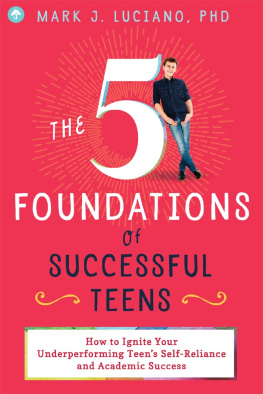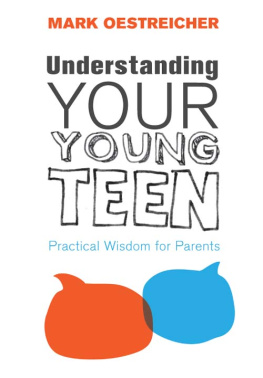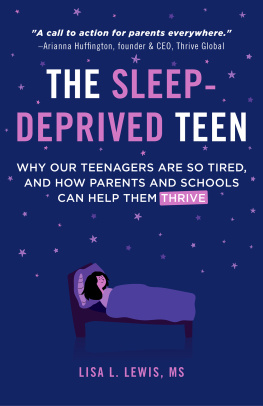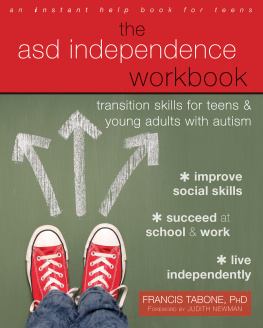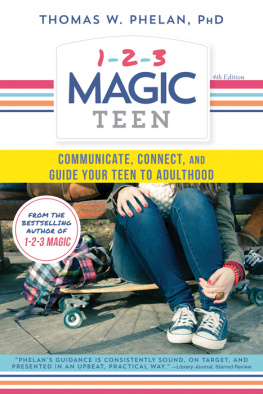

Copyright 2018 by Mark J. Luciano, PhD All rights reserved.
Published by Familius LLC, www.familius.com Familius books are available at special discounts for bulk purchases, whether for sales promotions or for family or corporate use. For more information, contact Familius Sales at 559-876-2170 or email orders@familius.com.
Reproduction of this book in any manner, in whole or in part, without written permission of the publisher is prohibited.
This book is designed to provide information and motivation to our readers. It is sold with the understanding that it is not engaged to render any type of psychological, legal, or any other kind of professional advice. No warranties or guarantees are expressed or implied. Neither the publisher nor the individual author shall be liable for any physical, psychological, emotional, financial, or commercial damages, including, but not limited to, special, incidental, consequential, or other damages. Some names and identifying details have been changed to protect the privacy of individuals.
Library of Congress Cataloging-in-Publication Data
2018937156
Print ISBN 9781641700375
Ebook ISBN 9781641700887
Printed in the United States of America
Edited by Lindsay Sandberg
Cover design by David Miles
Book design by inlinebooks
10 9 8 7 6 5 4 3 2 1
First Edition

To all parents who work hard to foster the good things in family life:
love, joy, peace, patience, kindness, gentleness, faithfulness, generosity, and self-control.
C ONTENTS

I NTRODUCTION
The Challenge-Averse Teen
R esearch has repeatedly shown that an alarming percentage of our students achieve below their academic ability. Its virtually a national epidemic.
In the United States, about fifty percent of students enrolled in college will never graduate, and the graduation rate is dropping.
Are you concerned that your son or daughter is smarter than their grades are reflecting? Are you worried that they have fallen into self-destructive patterns that could influence the rest of their lives? These are the warning signs that have likely brought you to read this book.
In my practice for over thirty years as a psychologist, school psychologist, and education consultant, I have seen over and over that high scores on standardized tests or IQ tests do not exempt teens from emotional and developmental turmoil. Its just a normal part of being a teen.
I remember being a teen quite clearly. When I think about it, I realize it wasnt paradise. Quite the opposite; I was a rather shy introverted kid. My family life was rather dysfunctional. Although I did well in school, it was in spite of my family and social environmentnot because of it. Most adults can look back and recall that being a middle-school or high-school aged teen meant all kinds of uncomfortable and downright awkward social situations on top of all the school pressure. And many teens have it tougher today than we did when we were kids! And even if your family doesnt appear to have the typical risk factors, your teenager may still be struggling with developing the key skills and character traits needed to succeed.
All types of academic, emotional, and social challenges are to be expected for teens. In fact, challenges are quite necessary for teens to eventually become successful adults. Well address more about this later.
I have seen that while most teens can do well in school, some are just not motivated. Many of the teens I have worked with over the years get stuck in a pattern of actively avoiding the ordinary challenges of being a teen. They have become Challenge Averse .
This book looks at Challenge-Averse Teens and proven ways for parents to help them succeed.
Common Characteristics
Challenge-Averse Teens share certain characteristics. Here are some of the glaring character traits that develop when teens actively avoid the challenges life puts in front of them:
Challenge-Averse Teens do not function independently. If a parent or teacher supervises a Challenge-Averse Teen, the project will be finished. However, when the parent stops supervising, the teen stops working. They may tackle academic challenges with a tutor, an interested teacher, or a parent, but usually not by themselves.
Challenge-Averse Teens have difficulty finishing projects. They may start many different projects, but will often not finish them. They dont have the persistence to completion in the short term or what we now call gritthe ability to be persistent and passionate over the longer term. How do we help teens develop these qualities? Challenge-Averse Teens do not adhere to time structures and deadlines. They push the limits. They need one more day or one more week. Sometimes, they complete ninety-nine percent of the project, but fail to turn it in.
Most Challenge-Averse Teens are in the average range of intelligence or better. Their academic difficulties are not chiefly due to ADHD or a learning disability, though these conditions may be a factor. Yet, whatever their native ability, Challenge-Averse Teens actively avoid academic challenges.
Challenge-Averse Teens may be described as lazy by parents and teachers. They know that they could do much better in their studies but they dont seem to have the desire to do so. They allow positive opportunities to sail by.
A common misconception is that Challenge-Averse Teens are unmotivated and rudderless. Actually, quite the opposite is true! Although Challenge-Averse Teens procrastinate, lie, and make excuses, all of this behavior serves a particular goal. Challenge-Averse Teens are highly motivated to avoid success at all costs.
Causal Factors
What is the root cause of teens actively avoiding and overcoming normal challenges? A Challenge-Averse Teen is afraid of eventually achieving independence. The notion of becoming an independent adult may be provoking anxiety (If I succeed today, then I will be expected to succeed tomorrow. If I succeed today and tomorrow, I will be expected to succeed for the rest of my life).
Sometimes, birth order is a factor. For example, if an older sibling is doing well in school, the younger brother or sister may consider the older sibling as perfect and give up trying. This occurs because teens want to establish their own identity and be different in some way from their siblings.
In other cases, a teen may compare themselves with their parents level of success and decide they cant compete. They drop out and decide to do something completely different.
If a parent is successful yet distant, the teen may remain distant and aloof from their parents.
Another factor is the focus on outcomes rather than process. If a teen brings home an A in math, a parent may say, Great! Lets celebrate and go out to dinner. The Challenge-Averse Teen thinks, This is pressure to get As in the future. However, the parent can choose to place the focus on the process rather than the outcome, relieving the teens sense of feeling pressured. The parent could do this by observing, You look happy about that. You are surprised you could do it. Or, if the Challenge-Averse Teen doesnt appear happy about the good grade, a parent may observe, Sometimes nothing feels right, which helps the teen to focus on their feelings rather than on the outcome alone.
Next page
